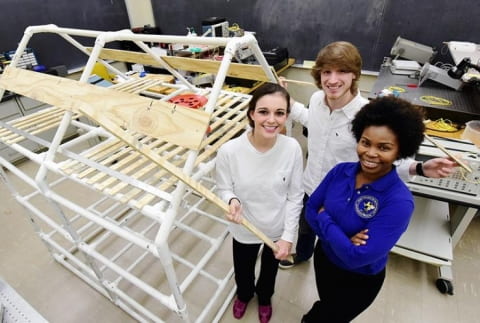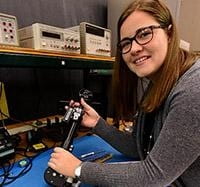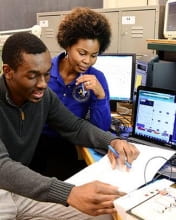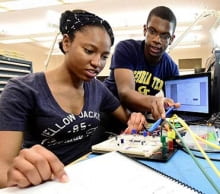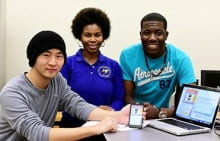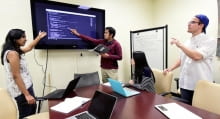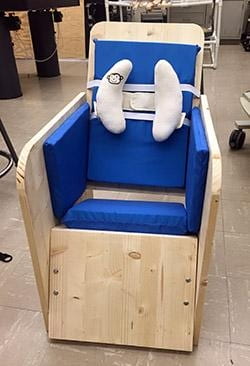Atlanta, GA
When asked what motivates them, many engineering students answer that they want to use their skills to make the world a better place. And while fame and fortune are great, today’s students realize that social good and success aren’t mutually exclusive. Just look at engineering mastermind and creator of PayPal, SpaceX, and Tesla Motors, Elon Musk. As undergraduate student Miller Tsao, who happens to admire Musk’s commitment to helping humanity, wisely states, “My main goal is to help as many people as possible. If I can support others, I know I’ll be able to support my family.”
Lucky for Tsao and the other 13,000 engineering students at the Georgia Institute of Technology, there’s now a concrete way to merge foundational knowledge and technical skills with social impact. The Engineering for Social Innovation (ESI) Center matches students with real-world projects for corporations and non-profit agencies. All projects aim to improve the lives of the under-privileged domestic population or people at the bottom of the pyramid in the developing world.
The Center started as a pilot in the summer of 2015 by Dr. Joyelle Harris, a faculty member in the School of Electrical and Computer Engineering. The Center now boasts four different methods of engaging the student body. The first cohort participates for course credit and includes eight interdisciplinary teams made up of 35 students. As a co-curricular avenue, students can join the Grand Challenges Scholars Program. For extra-curricular options, students can participate in ESI organizations Engineers without Borders or Enterprise-2-Empower. For students who are interested in a work study option, the Center also sponsors ESI Fellows.
Dr. Harris, who is the director of ESI, was aware that many engineering students do not make the connection between what they learn in class and the impact they can make on society. She wanted to provide an opportunity for students to solve actual engineering challenges for non-profit and corporate organizations and see the positive results they can make in someone else’s life.
In addition to mentoring several student teams, Harris also develops and nurtures relationships with the project sponsors. The main criteria when looking for projects and partnerships are: the partner must make a positive societal impact, the partner must have direct touch points with the people they serve, and the projects must have an engineering challenge that builds on Georgia Tech students’ classroom learning.
The program supports a variety of projects including a customized baby seat for orphanages in India, a smart wheelchair, an app for a children’s nutrition bar, a water filter program for Tanzanian villages, and a temperature and light detection system for a summer camp that serves children with disabilities and terminal illnesses.
“I want my students to make the connection between their engineering skills and their benefit to society. For example, customized seating for a child with a disability can cost over $1,000. My students built a chair for disabled children in low-resource regions for under $50. When my students see these kids use the chairs they designed, they know that they can use engineering to make a difference in this world,” said Harris.
As Harris makes more connections, the list of projects, and the need for students, will grow. Harris also hopes to add technology consulting to ESI’s services in the future. She plans to train students to be technology consultants for non-profits, providing the organizations with expert advice on their technology questions and students with more real-world experience for their resumes.
Learn more about some of ESI’s current projects below. To get involved, visit the ESI website.
Smart Wheelchair
Industrial engineering major Brooke Beisner has worked on two different projects under the program. Last semester, she worked on the Smart Wheelchair team in conjunction with The Rehabilitation Engineering and Applied Research (REAR) Lab, headed by Professor Stephen Springle. Students outfitted a Quickie IRIS wheelchair with multiple sensors that measured knee, foot, and back rotation, as well as leg extension. The measurements will be used to analyze wheelchair usage in order to create economical smart wheelchairs that can adjust to the individual needs of users.
Georgia Center for Nonprofits
This semester, Beisner switched teams to work on a database project for the Georgia Center for Nonprofits. Her group is creating a system that automatically generates monthly capacity reports. Right now, the Center is creating them by hand, a tedious job. Phase two of the project will involve improving the backend data query interface to be more user friendly. Students automate the reports by using a suite of Google products.
Evolv Bar
Miller Tsao, a computer science major, and his teammate Christian Harris, a computer engineering major, are getting a chance to flex their application building skills for a non-profit called The Evolv Bar Project, which produces complete nutrition bars that feed children in impoverished countries. The project has been a great learning opportunity. Not only have Tsao and Harris learned to design and develop a first generation iOS mobile app, but they have also learned about the process involved with getting it approved by the App Store.
Tsao and Harris learned to code in AngularJS, HTML, and SASS for the project. They hope that the new application will help the organization advertise and sell up to 50% more bars, in addition to supporting testing of new products and services.
SPOON Foundation
The SPOON Foundation works in orphanages, foster care, and low resource community settings around the world to improve feeding and nutrition for children with disabilities. The children are usually fed in ways that do not meet best practices for feeding. One of the most common feeding practices seen in these settings is improper positioning; for instance, children are often fed lying flat on their backs. Even when caregivers attempt to sit them up, they have no means to do so properly. The poor feeding practices contribute to malnutrition, illness, loss of dignity/quality of life, and death. The output of this project is a customized seating solution that enables caregivers to position children properly for feeding. ESI students have already created a prototype out of wood that costs only $50 USD to produce. The prototype will be sent to India in the coming weeks for testing and feedback.
SAFE Water Now
Another example of ESI’s global reach is current projects for SAFE Water Now, a U.S. non-profit that provides knowledge and resources to solve the problem of unsafe drinking water in Tanzania. Safe Water Ceramics, the organization’s manufacturing partner in Arusha, Tanzania, consists of one man who produces sustainable and affordable ceramic water filters for household use. Made of clay, sawdust, and colloidal silver, the filters can last up to five years and cost only $40 USD.
While thousands of filters have been delivered to rural and urban families, schools, and orphanages, the demand continues to grow. Right now, only 100 filters can be produced each month, and that’s where ESI comes in.
Three separate ESI teams are working to make Safe Water Now’s process for creating the filters more efficient. One group is creating a test tube incubator that tests the water before and after it is filtered, by adding a bacterial agent and heating it to an exact temperature. A second group is building a drying tent for the filters that is made out of inexpensive, lightweight, readily available materials. To power the incubator and the drying tent, another team is developing a solar powered generator. With these three innovations in place, which are all still in the prototyping phase, students estimate that production can increase from 100 filters per month to 500.
“This project has been the biggest highlight of my college career. We all want to be able to help, but we don’t always know how. ESI has made taking my skills and applying them to something meaningful an amazing, effortless, and natural process,” said industrial engineering major and member of the SAFE Water Now incubator team, Meriem Guehaiz.
Images: 1. Electrical engineering major Amanda Remus holds a leg brace from the Smart Wheelchair. 2. Dr. Joy Harris with electrical engineering major Allen Ndemera from the Camp Twin Lakes team. 3. Industrial engineering major Bryanna Land and electrical engineering major Kinsey Blackmore are part of the Camp Twin Lakes team. 4. The Georgia Center for Nonprofit team members include computer science graduate student Monica Reddy, computer science major Ishan Waykul, industrial engineering major Stephanie Tang, and computer science major Jeremiah Dir. 5. Mechanical engineering major Taylor Benson and aerospace engineering major Brett Rushing pose with Dr. Joy Harris in front of the Smart Water drying tent framework. 6. Customized seat for the SPOON Foundation project.


